Integrating Development Education into Business Studies: The Outcomes of a Consultative Study
Finding the 'Historically Possible': Contexts, Limits and Possibilities in Development Education
Abstract: Value Added in Africa (VAA) is a social enterprise working to help build incomes and secure livelihoods through increased value addition in African trade. In the course of their work they uncovered a marked reluctance on the part of buyers and suppliers in Europe towards doing business with African companies. This article captures the outcomes of a study undertaken by VAA in response to this problem of bias towards African suppliers and products. The study engaged with the business sector, business students, development education practitioners and academics. The study concluded that an intervention in third level business education was warranted to inculcate improved awareness and understanding of the impact of business on development, and to build awareness among business students of their potential as future business leaders in making choices which affect poorer people.
The Fellowship in Business and Development was established in 2013 as a partnership between VAA and UCD School of Business, to work across all business schools in Ireland. This paper relates the study’s findings, how the Fellowship was designed, and the early experience of implementing the programme in 2013/2014.
Key words: Business; Trade; Africa; Development; Education; Tertiary.
This paper captures the early experience of Value Added in Africa (VAA), a UK and Ireland based non-profit social enterprise, in introducing a development education initiative into Ireland’s third level business schools. The education system currently offers young people the opportunity to consider development issues and the interdependency between ‘developed’ and ‘developing’ countries as part of their primary and secondary education, however they lose the opportunity to continue to apply these theories as they move into third level education, and begin to forge ideas about their working lives. The initiative stems from a recognition, gleaned from VAA’s experiences of working on trade, that development matters are generally overlooked in business. This in turn means the potential for business to impact positively on poverty reduction is largely unrealised.
VAA was founded in 2008 with a mission to open channels for African businesses into European markets. The objective is to alleviate poverty among communities in Africa through helping the development of sustainable livelihoods. VAA acts as a ‘trade facilitator’ between African producers of shelf-ready products and retailers based in Europe. The focus is to help build incomes and to secure livelihoods through increased trade of African value-added goods.
VAA’s experience of bringing competitive, high quality African products to the attention of European buyers uncovered a marked reluctance on the part of retailers and buyers to doing business with African companies. Even when presented with a compelling business case, the former appeared to shy away from dealing with the latter. On probing this further, it was found that buyers lacked confidence in the reliability or dependability of the supply chain, the stability of factories and the production environment, and in quality, even where the requisite industry standards were being met. In short, VAA found evidence of wariness among business people towards doing business with Africa.
This paper charts VAA’s response to the problem that businesses are overlooking genuine opportunities to grow their business and to impact positively on poverty. A consultative study examined the influences business people experience in relation to business, development and Africa. The study included a stakeholder consultation (business people, business educators, development educators and students), a curriculum review and a survey of third level students’ knowledge and attitudes to business and Africa. Following the study a model of intervention in third level business education was developed and is currently being deployed as the Proudly Made in Africa Fellowship in Business and Development. The aim is to build the capacity of business lecturers in terms of incorporating content on business and development, with a focus on Africa, into their current courses.
This paper shares the main findings of the study and how the resulting Proudly Made in Africa third level development education fellowship was subsequently designed and implemented in its first full year of operation in 2013/2014. The paper aims to build knowledge and understanding of the initiative among the development education practitioner and research community.
Analysis
The consultation study engaged with business people, development and business educators, and business students. This section outlines the findings which resulted.
Business sector
Interviews were held with business people and business representative organisations to explore their perceptions and experience of doing business with African companies, or on sourcing products originating in Africa. A number of lessons emerged including: lack of understanding of Africa as a set of markets; poor previous experiences in terms of reliability of sourcing from Africa; and an overall bias against looking to Africa as a source of finished products. Business actors displayed a high degree of comfort and familiarity with sourcing from other emerging markets (Southeast Asia in particular) and were content to minimise their exposure to risk by staying with known suppliers and markets.
These factors combine to an avoidance of change, and consequently a reduction in business potential for African producers, leading to genuine business opportunities being overlooked, and creating additional barriers to improving the supply chain from African sources.
Education
Business educators
The consultation with educators in schools of business, alongside a curriculum review, found that business modules, including on international or global business, marketing, cross-cultural management and supply chain management, generally do not include African cases or experiences. Despite the pervasiveness of globalisation and the focus on emerging markets, business courses pay scant attention to the role of business in development. This is despite the fact that inclusive or sustainable business, maintaining its for-profit nature, can contribute to poverty reduction through the inclusion of low-income communities in its value chains. Inclusive business is about including the poor in the business process, be it as producers or consumers. However, the curricula and course content of business schools in Ireland rarely feature such content or examine Africa, whether as a set of markets or as a source of competitive resources. This means the potential for business to impact positively on poverty reduction is largely not realised (Cowzer, O’Caoimh and Pacteau, 2013).
However, the initiative relates to recent movements in the third level business education sector such as Principles for Responsible Management Education (PRME). RRME arose from the UN Global Compact and has since 2008 been adopted by more than 500 business colleges worldwide (University College Dublin (UCD), Dublin City University (DCU) and the University of Limerick in Ireland). Of the six PRME principles, three support the notion of content on sustainable and inclusive business, with a focus on Africa.
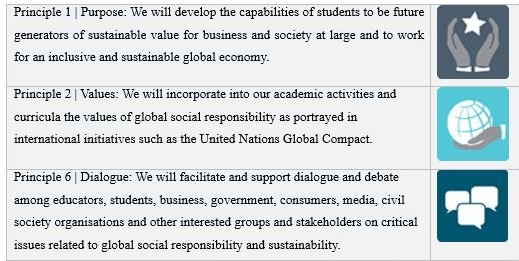
Table 1. Extract of PRME principles (www.unprme.org/about-prme/the-six-principles.php)
Development educators
The study examined the experience of development education promotion more generally up to now, looking specifically at the Development and Inter-Cultural Education (DICE) initiative in offering some insights into the task of mainstreaming at third level. The DICE project provides support to the five primary sector teacher education colleges to integrate development and intercultural education into existing initial teacher training programmes. The goal is to equip student teachers with the skills and knowledge necessary to introduce these issues to relevant areas of the primary school curriculum.
DICE adopted a ‘champions’ approach by identifying interested individuals within the teaching colleges that could act as advocates for the initiative and provide an access point to the school. A one year pilot (2003) included giving presentations and providing teaching resources. Between 2004 and 2007 DICE worked with all five colleges of education. DICE project workers carried out visits to training colleges and delivered sessions to student teachers on development issues. A staff network was built in the colleges, by working with the champions and organising events. This greatly facilitated the engagement of the colleges with the DICE project and its aims (Cowzer, O’Caoimh and Pacteau, 2013: 14).
The DICE project secured Irish Aid funding in 2007, enabling the appointment of dedicated staff to provide specialist DE and intercultural teaching at each of the five colleges. The role of DICE’s work in addressing some of the issues of Irish Aid’s Development Education Strategy was an important factor in securing this funding. The provision of funding for part-time lecturers was reported as contributing greatly to the further engagement and cooperation of the colleges at this time, providing the project with an attractive burden-sharing capacity.
Among the key lessons from the DICE experience for VAA were: the importance of establishing viability and demand for the project at an early stage; identifying champions within the target institutions that can act as entry points; building these contacts into a network of interested educators and decision makers within these institutions; and helping to share the burden of developing resources and knowledge to enable ‘insiders’ to take up the issue and get it incorporated.
Business students
As part of the study VAA implemented a baseline survey of the knowledge and attitudes of business students in Ireland in early 2013. Students of business were considered to be a stakeholder group as they are likely to be in positions to engage in trade in or with African countries in the future. A total of 1,654 students were reached through an online survey, of whom 418 (25 percent) were business students. Of the business students surveyed, 92 percent were full-time and 8 percent were part-time students. Thirty-six percent of business students attended a university, 48 percent attended an institute of technology and 16 percent attended other educational institutions, predominantly private colleges. There was a 50 percent male and 50 percent female split among the business students (Alken, O’Caoimh and Pacteau, 2013).
The survey found very low levels of knowledge among business students of the business environment in Africa. When asked to self-assess their knowledge of the business environment in Africa, 58 percent of business students said their knowledge was ‘poor’. The respective figure for all other students was 68 percent. Therefore business students felt only marginally more knowledgeable about business in Africa compared to other, non-business students. The survey revealed that students’ key associations with Africa were ‘wildlife’, ‘famine and poverty’ and ‘charity/volunteering’ (ibid).
Figure 1. Students’ self-assessment of knowledge of business environment in Africa (Alken, O’Caoimh and Pacteau, 2013: 6)
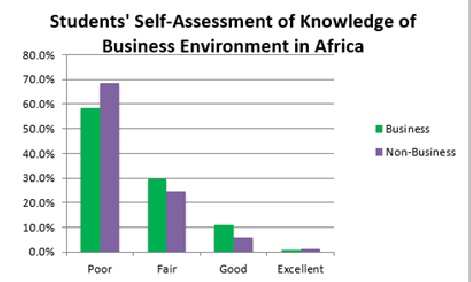
On the other hand, as demonstrated by Figure 2, business students displayed a very high level of interest in learning about business in Africa (91 percent) and in learning about business’ role in creating positive social change (95 percent). VAA’s survey outcomes support findings in a Suas (2013) commissioned survey, conducted by Amárach, which found that although 85 percent of 1,000 third level students feel it is important to ‘do something to improve the world’, nearly half of the students (45 percent) agreed with the statement that they ‘feel helpless in bringing about positive change’.
Figure 2. Students’ interest to learn more (Alken, O’Caoimh and Pacteau, 2013: 6)
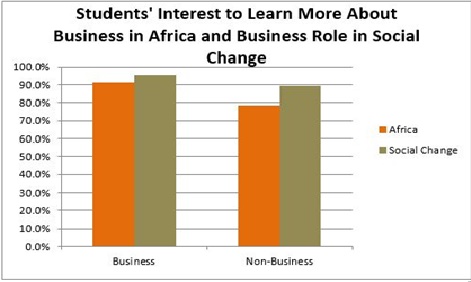
African students in Ireland
Interviews were carried out with representatives of African students studying in Ireland, by meeting with representatives of the society of African Students in Ireland and with Dublin City University’s (DCU’s) Africa Society. African students are acutely aware of the negative image of African countries that persists within wider Irish society (and also reported this negativity as existing within the African student community itself). The students expressed significant support for the aims of the project. The wider impact of presenting Africa as a destination for business and investment rather than for aid alone was keenly welcomed by those interviewed. Business school courses that offered wider, global perspectives was seen as particularly attractive to international students, and predicted to become an important factor for Irish universities.
Students’ sources of information
Students were asked about their main source of information on the business environment in Africa. College courses ranked as the fourth source of information through which business students learn about the business environment in Africa. The media, internet and charities, all ranked as more important sources than colleges for business students.
Figure 3. Students’ sources of knowledge of the African business environment (Alken, O’Caoimh and Pacteau, 2013: 8)
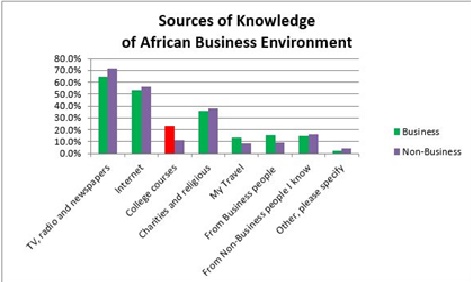
Study findings
There is a track record of commitment to development education by practitioners (NGOs, educators, funders) at primary and secondary levels in Ireland. However there is very little development education content at third level; this was certainly found to be true for business and commercial courses (Cowzer, O’Caoimh and Pacteau, 2013). This means that young people who have had the opportunity to consider development issues and the inter-dependency between ‘developed’ and ‘developing’ countries lose the opportunity to continue to apply these theories as they begin to forge their ideas about their working lives. The study found high levels of interest across business, educators and students in changing this state of affairs.
The viewpoints gathered from business lecturers, business representative groups, and those in development education were consistent; the curricular content of business and development education ought to incorporate content on the following critical dimensions:
- The role business can play in contributing positively to development;
- The role business can play in meeting the market opportunities and needs that arise in a rapidly growing and changing Africa;
- The particular responsibility of business to respect human rights and the rule of law;
- Legal frameworks (ranging from International Labour Organisation standards to anti-corruption international law) and the need for regulatory frameworks to promote business practices which are ethical and in keeping with local and international law (ibid: 21).
The study concluded that an intervention in third level education, based on the above criteria and focused on business students, was warranted in order to build capacity among business lecturers on the topic, to inculcate improved awareness and understanding of the impact – positive and negative – that business has on development, and to build awareness among business students of their potential as business leaders in making choices which considerably affect poorer people – again either positively or negatively.
Introducing development education to third level business colleges
To create those new opportunities for business students to learn about how they can positively support trading links in Africa, the Proudly Made in Africa Fellowship in Business and Development was initiated in partnership with UCD School of Business in early 2013. The objective is to work with educators to build their capacity and to support them to incorporate material and research on sustainable business, with a focus on the role business plays in development. This impacts on business students, as the future business leaders, to build their knowledge and inform their practices in doing business in and with Africa in the future. The message to business students is that the choices they make in business will (positively or negatively) affect the poorest people on the planet. In this increasingly globalised world it is possible to make an informed choice to conduct business sustainably and profitably, and doing so has the potential to transform the lives of some of the poorest people on the planet. One such decision is where and how to source products and raw materials. Managing sustainable supply chains is more vital than ever. For instance, following the tragedy in Rana Plaza, in Savar, Dhaka, Bangladesh in April 2013, when 1,134 people lost their lives, consumers became more highly sensitised about how their products are made and now wish to be assured that the clothes they wear are produced ethically. Fashion companies are increasingly aware of the risk to their reputation when it comes to human rights, health and safety standards, and the working hours of suppliers. Consumers are increasingly conscious of these issues and are demanding that companies be transparent and sustainable in their operations.
The Proudly Made in Africa Fellowship in Business and Development
Development education aims to raise public understanding of the complex causes of poverty, and increase understanding of the interconnections between lives in the West and the lives of those in developing countries. Further, development education seeks to expose the West’s structural relationship with developing countries, and to show how this relationship is directly linked to global inequalities. Overall, the aim of development education is to encourage people to engage in personal and socio-political actions that are intended to bring about positive global change. Development education also sets out to counter stereotypical assumptions, based around dependency and helplessness, which people in the West might draw upon to construct their relationship with the global South. The Proudly Made in Africa Fellowship in Business and Development initiative seeks to broaden that engagement to strategically engage business education to reach the business sector, not previously a focus for development education.
Phase One 2013/2014
The Proudly Made in Africa Fellowship in Business and Development was established by VAA in partnership with UCD School of Business in mid-2013 with the aim to work across all business schools in Ireland so that all accredited third level business courses include a global perspective of business’ role in stimulating development. University College Dublin (UCD) School of Business was one of four third level colleges who actively engaged with the consultation and piloted seminars, (the others being National University of Ireland [NUI] Maynooth, DCU and Griffith College Dublin). UCD School of Business offered to partner and host the initiative, to work from a base at UCD to reach out to all third level business colleges. The rationale was that placing the fellow’s role within the university setting would enhance the chances of getting traction and engagement in the wider third level sector (it had originally been envisaged that the position would be placed within VAA).
Pedagogic approach
Following on from the study, which included a stakeholder consultation, a curriculum review and a students’ survey, the following model of intervention was developed and is currently being deployed.
Table 2. Model of intervention (extract of Fellowship Implementation Plan, VAA internal document, 2013)
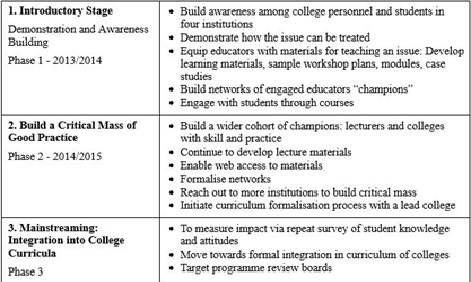
Unlike at the primary and secondary levels of education, there is no centrally developed curricula at third level, so each school and each course represents a separate target. The initiative has focused on working with interested lecturers by offering to contribute a guest lecture to their existing course and to add value to their courses through the introduction of concepts on business’ role in stimulating development. The input went further, in some cases contributing exam questions, Africa related project topics, and case studies. The education initiative aims not just to change the behaviour of individual lecturers – although individual lecturers are the first priority – but to change the behaviour of a wider group of business lecturers over time, by building their capacity to incorporate development education themes into their core content. The particular approach draws on Field theory to identify and understand the forces impacting upon the group to which the individual belongs, and also draws on Group Dynamics theory to understand why members behave the way they do (Lewin, 1947).
Building on that, the approach taken is to apply a three step process to achieve change. The first step involves working with lecturers who are open to questioning the status quo and who already perceive, or have a ‘felt need’ for, change on the subject, targeting them initially in order to model and build experience and learning. Lewin referred to this as ‘unfreezing’ in his Three Step Model for successful change. From that, lessons are being learned, and the initiative will adapt by taking those lessons on board, with the aim of reaching a wider cohort of business lecturers at the institutional level. According to Lewin, planned change is difficult to achieve because of the complexity of forces; therefore the initiative will work on a trial-and-error basis, or in other words, adopting a ‘learning approach’. This is the ‘moving’ or second stage of Lewin’s Three Step Model and equates to phases one to two in Table 2 above. The final stage will be ‘refreezing’, or establishing the practice of input on African business as a regular or normal feature of third level business courses in Ireland. Broadly this refers to phase three in Table 2 above.
The experience so far
In phase one (2013/2014), the initiative’s first year of full operation, the initiative engaged with seven business schools, 2,300 students and a range of other stakeholders. The project was reviewed at the end of the year and lecturer feedback gathered. Levels of interest and participation in the initiative were positive, and feedback offered valuable insights as to how to deepen engagement next year, moving beyond individual lecturers to engage across business departments. Overall the response and participation levels exceeded expectations, and set a good foundation to build on in the coming years. The specific objectives and outcomes for phase one are outlined in Table 3 below.
Table 3. Phase one objectives and outcomes (Cowzer, O’Caoimh and Pacteau, 2013: 23)
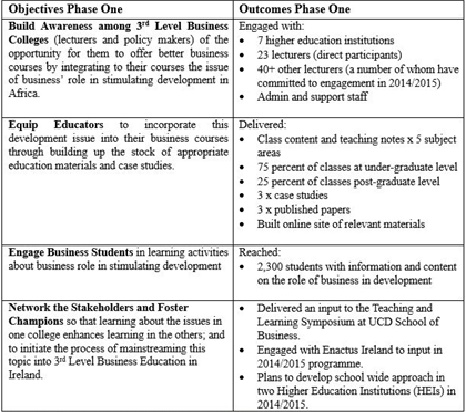
Lecturer feedback
Feedback was gathered from nine of the participating lecturers by way of a number of face-to-face interviews and an e-mail questionnaire in May and June 2014. All expressed satisfaction with their engagement and interest in working with the initiative in 2014/2015. Along with suggestions for improvement, some admitted to not feeling hugely competent to teach on topics relating to Africa, on the basis of personal lack of knowledge with the subject matter or of African-related case studies. This reinforces the capacity-building approach adopted by the project. Their feedback offers a strong basis for the project as it moves forward.
Reflections and conclusion
The approach of working with lecturers to offer relevant guest lectures was well received, and offers a good foundation to build on in future phases. Engaging with lecturers in this way offers the possibility of developing confidence and building trust, of making a real contribution to the educators’ own targets, and the opportunity to develop and build a wider partnership across business schools in the future. The early lecturer participants self-elected to participate; by definition they were more interested, motivated and able to engage with the subject matter. The objective of mainstreaming the project within the wider business school will be pursued by working closely with the early adopter lecturers, who can help ‘champion’ the value and benefits of the initiative to their colleagues.
There is evidence of an appetite for inputs of this nature from students with a number opting to focus their thesis or their course projects on aspects of doing business in or with Africa. Outside the classroom, of the eight Enactus Ireland national final projects in 2014, three featured African businesses. The experience in phase one shows there are a set of development education issues which are highly relevant to business and relevant in the classroom. These include marketing to base of pyramid (BOP) markets, creating inclusive business, developing sustainable supply chains, cross-cultural management and marketing. The experience from phase one validates the proposition that students and academics want input of this nature.
There are diverse opinions within business schools as to the relevance of development education within business education. While the participating lecturers obviously see the relevance, some lecturers consider that business should be measured purely in financial terms, and see that other metrics are secondary, or not relevant. However this initiative speaks to the ideas in the Principles for Responsible Management Education (PRME) and can support business colleges genuinely seeking to engage with PRME. Capacity building and relationship building require time, as do behavioural change (Lewin, 1947). The change process is inevitably longer than allowed for in an annual funding cycle. Lecturers also reflected the desire for more time to present the material in advance of class, and for post-class reflection – a constant challenge not only in this context. Time should be allowed for the relationships to develop and for the proposition to be tested, improved and measured.
The partnership between VAA and UCD School of Business, supported by visible senior leadership in the School has proven effective in building awareness and strong levels of participation across departments and at all levels of teaching within the UCD School of Business. It is also helpful as a platform from which to continue to build links to other third level institutions. In conclusion, as the project prepares for its second year and incorporates these lessons learned, it will seek to deepen engagement across four business school by working with lecturers to create a learning pathway for students at the different levels of study. Indications are positive that the project will be able to achieve this in the coming year.
There is a need to continually critique both the intervention and the subject matter itself. This can be achieved by openness to engagement across business schools and with other parts of academia. The plan is to develop content and critical reflection on the intersection of business and development, not merely to act as an uncritical proponent. There are plans to repeat the baseline survey, subject to resources being available, in year three or four. Finally, this paper charts VAA’s investigation into influences on doing sustainable business in and with Africa. It presents the background and first results of a third level development education initiative that aims to build the capacity of business lecturers in terms of content on business and development, with a focus on Africa. As well as sharing the progress so far, the aim of the paper is to build knowledge and understanding of the initiative among the development education practitioner and research community. Engagement and feedback from anyone interested is welcomed
References
Alken, E, O’Caoimh, C and Pacteau, A M (2013) Knowledge and Attitudes to Business’ Role in Development in Africa: A Baseline Survey of 3rd level business students in Ireland, Dublin: Value Added in Africa.
Amárach (2013) Attitudes Towards Development Cooperation in Ireland: Report of a National Survey of Third Level Students on Global Development, Cork: Suas, available: http://www.suas.ie/sites/default/files/documents/Suas_National_Survey_2013.pdf (accessed 4 July 2014).
Cowzer, B, O’Caoimh, C and Pacteau, A M (2013) Business Education to Promote the Role of Business in Stimulating Development: A feasibility study on mainstreaming the role of business in development into the curriculum of Irish third level business schools, Dublin: Value Added in Africa.
Irish Aid (2007) Irish Aid’s Development Education Strategy Plan 2007-2011 (extended to 2015), Dublin: Irish Aid, available:https://www.irishaid.ie/media/irishaid/allwebsitemedia/20newsandpublications/publicationpdfsenglish/development-education-strategy-plan-2007-2011.pdf (accessed 2 July 2014).
Lewin, K (1947) ‘Frontiers in group dynamics’ in D Cartwright (ed.) Field Theory in Social Science, London: Social Science Paperbacks.
UN (2007) Principles for Responsible Management Education, available: http://www.unprme.org/about-prme/the-six-principles.php (accessed 2 July 2014).
Siobhán McGee is Proudly Made in Africa Fellow in Business and Development, based in UCD School of Business and working across all the business schools in Ireland. She has worked in the international development sector since 1991, including three years in Kenya and Malawi. Siobhán has an MBA from The Open University Business School and lectures part-time at Masters levels on NGO and Voluntary Sector Management. The Fellowship is funded by Irish Aid, with support from Concern, Trócaire and Gorta. For more information see:www.proudlymadeinafrica.org/education.





